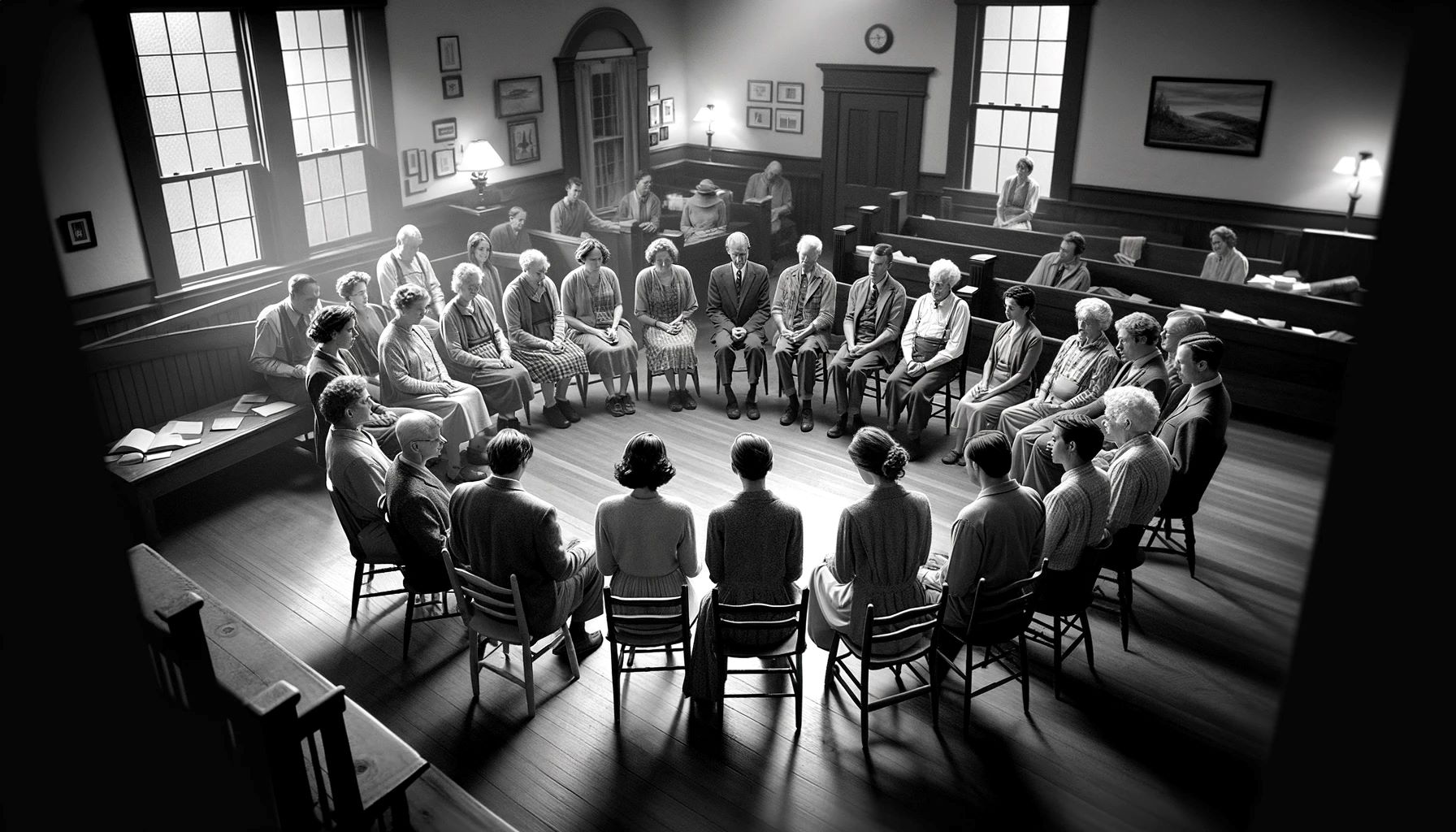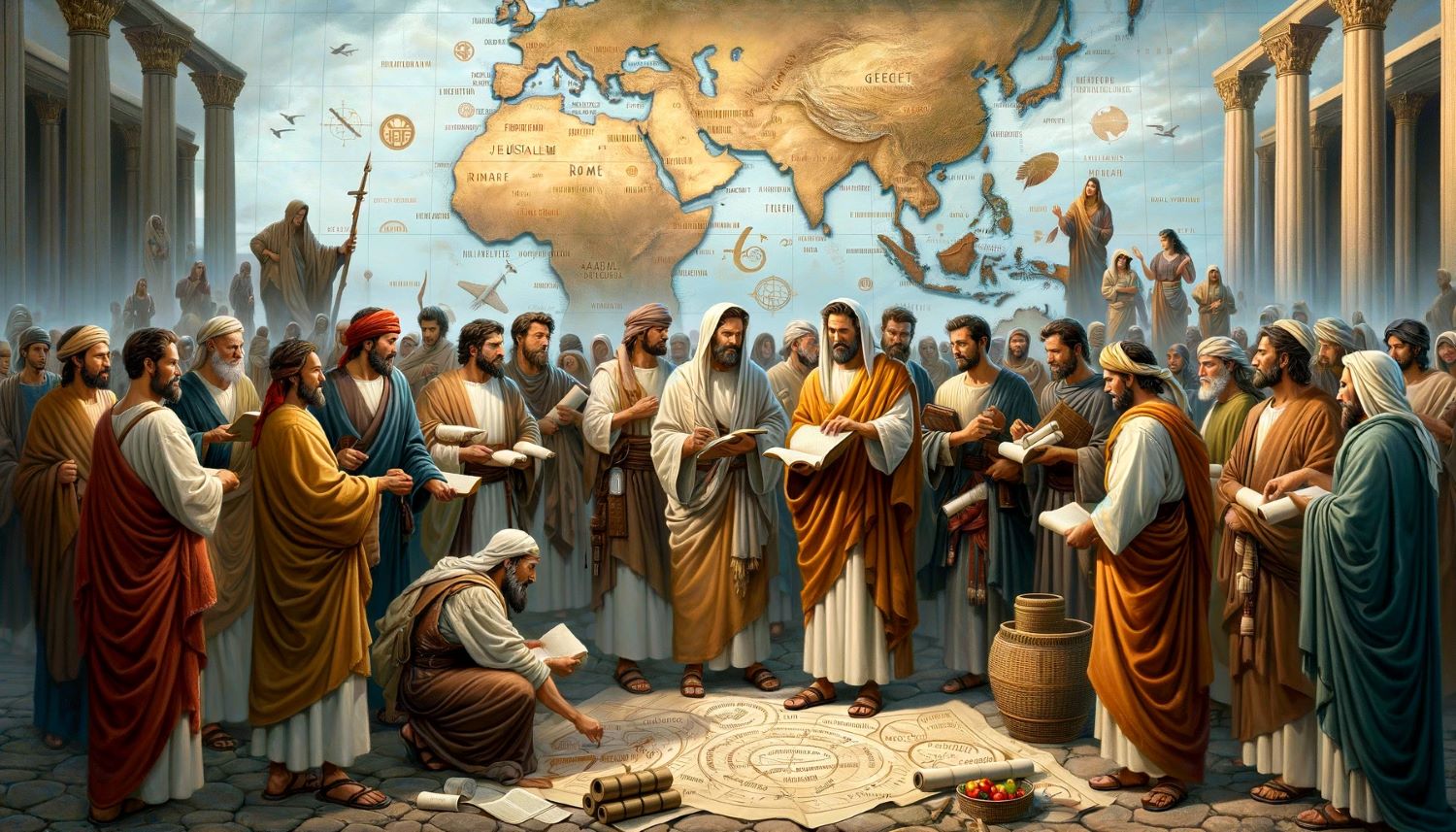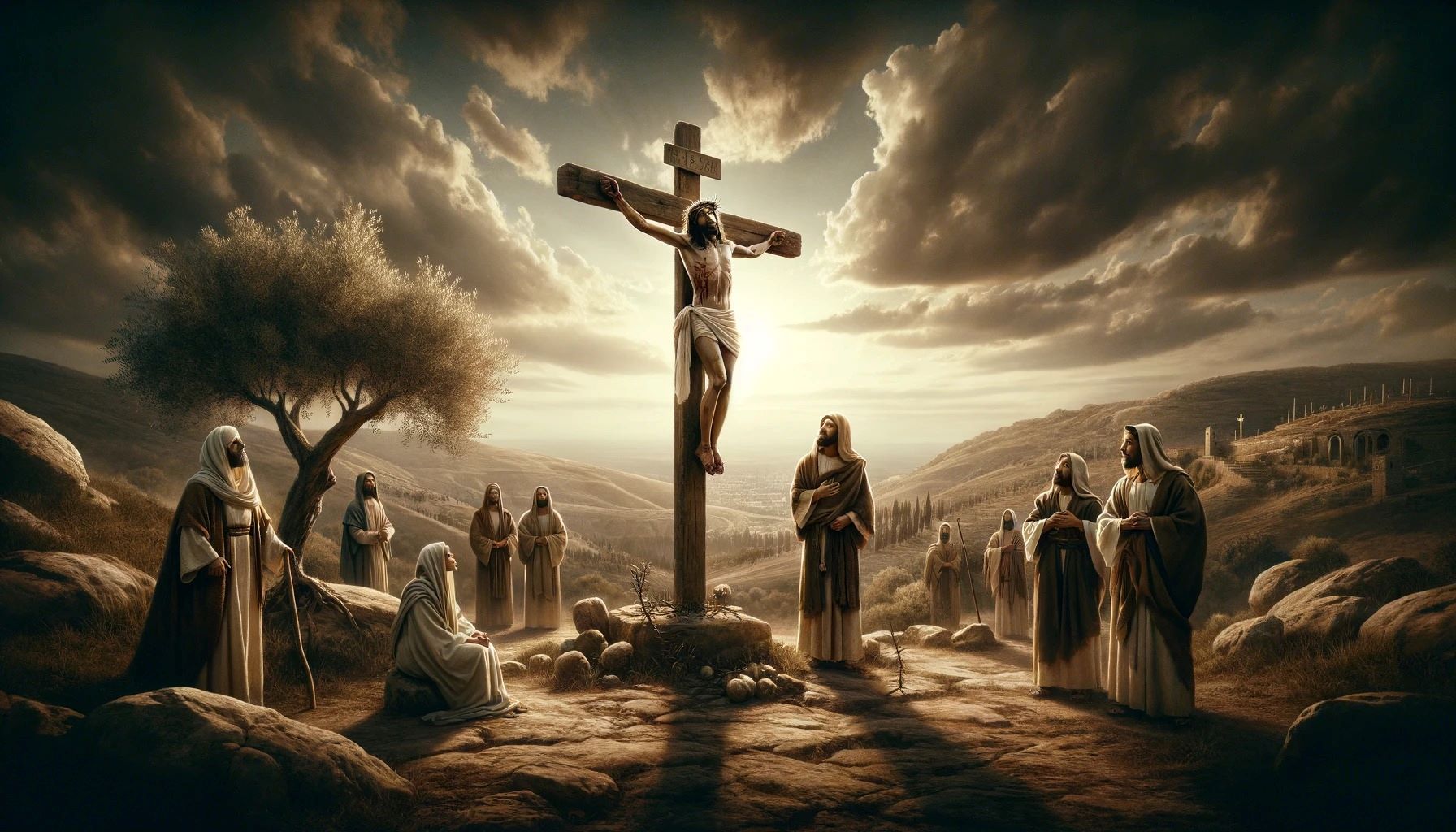Home>Theology and Spirituality>Where Did The Charismatic Movement Start


Theology and Spirituality
Where Did The Charismatic Movement Start
Published: February 11, 2024
Jason DeRose, Managing Editor at Christian.net, uses his expertise in religion and journalism to deepen understanding of faith's societal impacts. His editorial leadership, coupled with a strong academic background, enriches the platform’s diverse content, earning him recognition in both journalism and religious circles.
Discover the origins of the charismatic movement and its impact on theology and spirituality. Uncover the roots of this influential movement and its significance in modern religious practices.
(Many of the links in this article redirect to a specific reviewed product. Your purchase of these products through affiliate links helps to generate commission for Christian.net, at no extra cost. Learn more)
Table of Contents
Introduction
The Charismatic Movement, a significant phenomenon within Christianity, has had a profound impact on the spiritual landscape of the 20th and 21st centuries. This movement is characterized by a fervent emphasis on spiritual gifts, such as speaking in tongues, prophecy, and healing, as described in the New Testament. The term "charismatic" is derived from the Greek word "charismata," which translates to "gifts of grace" or "gifts of the Spirit."
The roots of the Charismatic Movement can be traced back to the early Christian church, where the apostles and early believers experienced the outpouring of the Holy Spirit on the day of Pentecost, as recorded in the book of Acts. This event marked the beginning of the charismatic expression of spiritual gifts within the Christian community.
Over the centuries, various individuals and groups within Christianity have experienced and emphasized the manifestation of spiritual gifts, contributing to the diverse tapestry of charismatic expressions. However, it was in the 20th century that the Charismatic Movement experienced a significant resurgence and widespread influence, leading to its recognition as a distinct movement within the broader Christian tradition.
The Charismatic Movement has transcended denominational boundaries, attracting followers from a wide spectrum of Christian traditions, including Protestant, Catholic, and Orthodox communities. Its impact has been felt not only within the realm of theology and worship but also in the realms of social activism, missions, and global Christianity.
As we delve into the historical and influential aspects of the Charismatic Movement, it becomes evident that its emergence and development have been shaped by a convergence of theological, cultural, and spiritual factors. Understanding the origins and evolution of the Charismatic Movement provides valuable insights into the diverse expressions of Christian spirituality and the enduring quest for a deeper experience of the divine.
The subsequent sections of this article will explore the early influences, key figures, and the widespread impact of the Charismatic Movement, shedding light on its significance within the broader narrative of Christian history and spirituality.
Read more: What Is The Hyper Charismatic Movement
Early Influences on the Charismatic Movement
The roots of the Charismatic Movement can be traced back to the early days of Christianity, particularly to the experiences and teachings documented in the New Testament. The foundational influence of the early church's charismatic expressions, as recorded in the book of Acts and the Pauline epistles, has significantly shaped the trajectory of the Charismatic Movement.
Biblical Precedents
The book of Acts portrays the outpouring of the Holy Spirit on the day of Pentecost, marking the inception of the charismatic dimension within the Christian community. The apostles and early believers were filled with the Holy Spirit, resulting in manifestations of speaking in tongues and prophetic utterances. These supernatural occurrences demonstrated the tangible presence and power of the Holy Spirit, laying the groundwork for the subsequent manifestations of spiritual gifts within the church.
The apostle Paul, in his letters to the Corinthians and other early Christian communities, provided theological insights and practical guidelines regarding spiritual gifts. His teachings on the diversity and proper exercise of spiritual gifts, as well as the edification of the church through their use, have served as foundational principles for the Charismatic Movement.
Historical Antecedents
Throughout church history, there have been intermittent instances of charismatic experiences and movements, often associated with periods of spiritual renewal and revival. The Montanist movement in the 2nd century, the ecstatic experiences of certain medieval mystics, and the rise of Pentecostalism in the 20th century are among the historical antecedents that have contributed to the development of the Charismatic Movement.
The Montanist movement, named after its founder Montanus, emphasized the ongoing work of the Holy Spirit and the manifestation of spiritual gifts within the church. Although it was later deemed heretical by the institutional church, the movement reflected a fervent pursuit of spiritual authenticity and the experiential dimension of faith.
Influence of Revivalism
The 18th and 19th centuries witnessed the rise of revival movements, such as the First and Second Great Awakenings in America and the evangelical revivals in Europe. These movements placed a strong emphasis on personal conversion, passionate worship, and the experience of the Holy Spirit's transformative power. The revivalist fervor and the emphasis on heartfelt spirituality laid a cultural and theological foundation for the Charismatic Movement's later developments.
In summary, the early influences on the Charismatic Movement encompass a rich tapestry of biblical precedents, historical antecedents, and the legacy of revivalism. These formative elements have contributed to the theological framework and spiritual ethos that continue to shape the contemporary expressions of charismatic Christianity.
Read more: What Is The Charismatic Christian Movement
The Beginnings of the Charismatic Movement in the 20th Century
The 20th century marked a pivotal era for the resurgence of the Charismatic Movement within Christianity. This period witnessed a notable revival of interest in the supernatural gifts of the Holy Spirit, leading to the emergence of charismatic renewal within various Christian traditions.
Azusa Street Revival
One of the defining moments in the early 20th-century Charismatic Movement was the Azusa Street Revival, which began in Los Angeles, California, in 1906. Led by African-American preacher William J. Seymour, this revival became a focal point for the widespread manifestation of spiritual gifts, particularly speaking in tongues and healing. The racially inclusive nature of the revival was remarkable for its time, as people from diverse backgrounds gathered to experience the outpouring of the Holy Spirit.
The Azusa Street Revival served as a catalyst for the global spread of Pentecostalism, a movement closely associated with the Charismatic Movement. The revival's impact reverberated across denominational lines, igniting a renewed emphasis on the experiential dimension of faith and the supernatural workings of the Holy Spirit.
Influence on Mainline Churches
In the ensuing decades, the charismatic renewal transcended the boundaries of Pentecostalism and began to influence mainline Protestant denominations, as well as the Catholic Church. Individuals within these traditions experienced a fresh awakening to the charismatic gifts described in the New Testament, leading to the formation of charismatic prayer groups and the integration of charismatic worship practices into traditional liturgical settings.
The Catholic Charismatic Renewal, in particular, gained significant momentum following a retreat at Duquesne University in 1967, where participants encountered a profound experience of the Holy Spirit. This event marked a pivotal moment in the history of the Charismatic Movement, as it demonstrated the movement's ability to transcend denominational barriers and permeate diverse theological contexts.
Global Expansion
As the 20th century progressed, the Charismatic Movement continued to expand globally, impacting churches and Christian communities around the world. Missionary efforts, mass media, and transnational gatherings facilitated the dissemination of charismatic teachings and practices, contributing to the movement's widespread influence.
The Charismatic Movement's emphasis on personal spiritual experiences, vibrant worship, and the supernatural gifts of the Holy Spirit resonated with believers in diverse cultural and geographical contexts, leading to the establishment of charismatic fellowships and networks across continents.
The 20th century thus witnessed the beginnings of a dynamic and far-reaching Charismatic Movement, characterized by its ability to transcend denominational boundaries, influence global Christianity, and reinvigorate spiritual fervor within the church.
This period set the stage for the continued evolution and diversification of charismatic expressions in the 21st century, shaping the contemporary landscape of Christian spirituality and worship.
Read more: When Did Catholicism Start In Spain
Key Figures in the Development of the Charismatic Movement
The development and expansion of the Charismatic Movement have been significantly influenced by key figures who played pivotal roles in shaping its theological foundations, promoting its spread, and fostering its integration into diverse Christian traditions. These influential individuals, through their teachings, writings, and leadership, have left an indelible mark on the trajectory of the Charismatic Movement, contributing to its enduring impact within the global Christian community.
Dennis Bennett
Dennis Bennett, an Episcopal priest, is widely regarded as one of the pioneering figures in the charismatic renewal within mainline Protestant denominations. In 1960, Bennett publicly shared his personal experience of being baptized in the Holy Spirit and the subsequent manifestation of spiritual gifts, sparking a wave of charismatic renewal within the Episcopal Church and beyond. His courageous testimony and pastoral leadership played a crucial role in fostering openness to charismatic experiences within traditionally non-charismatic churches.
Kathryn Kuhlman
Kathryn Kuhlman, a renowned evangelist and faith healer, became a prominent figure in the charismatic and healing revival movements of the mid-20th century. Her ministry, characterized by dramatic healing services and a palpable sense of the Holy Spirit's presence, attracted large audiences and contributed to the popularization of charismatic spirituality. Kuhlman's emphasis on the reality of the Holy Spirit's power and the manifestation of supernatural gifts inspired countless individuals to seek a deeper encounter with the divine.
David du Plessis
David du Plessis, often referred to as the "Apostle of Pentecost," played a pivotal role in fostering unity and collaboration within the global charismatic movement. As a Pentecostal leader, du Plessis engaged in dialogue with leaders from various Christian traditions, advocating for the recognition of charismatic experiences as a legitimate expression of Christian faith. His efforts to bridge denominational divides and promote ecumenical cooperation significantly contributed to the acceptance and integration of charismatic beliefs and practices across diverse theological contexts.
Oral Roberts
Oral Roberts, a prominent televangelist and founder of Oral Roberts University, exerted a profound influence on the charismatic movement through his media outreach and emphasis on divine healing and prosperity. Roberts' televised healing crusades and evangelistic fervor brought the message of charismatic renewal to a broad audience, shaping the popular perception of spiritual empowerment and the miraculous within the charismatic ethos. His ministry contributed to the widespread dissemination of charismatic teachings and the incorporation of charismatic elements into contemporary Christian worship.
These key figures, among others, have played instrumental roles in advancing the Charismatic Movement, contributing to its theological articulation, global expansion, and enduring relevance within the diverse tapestry of Christian spirituality. Their collective impact underscores the dynamic and transformative nature of the Charismatic Movement, reflecting a profound engagement with the supernatural dimensions of faith and the ongoing work of the Holy Spirit within the church.
Spread and Impact of the Charismatic Movement
The Charismatic Movement, characterized by its emphasis on spiritual gifts and the experiential dimension of faith, has experienced a remarkable spread and exerted a profound impact within the global Christian landscape. Its influence has transcended denominational boundaries, reshaping worship practices, theological discourse, and the lived experiences of believers across diverse cultural and geographical contexts.
Global Reach
The Charismatic Movement's influence has extended far beyond its initial 20th-century origins, permeating churches and Christian communities worldwide. Missionary endeavors, transnational conferences, and the proliferation of charismatic media have facilitated the dissemination of charismatic teachings and practices, contributing to the movement's global reach. As a result, charismatic fellowships and networks have emerged on every continent, reflecting the movement's ability to resonate with believers from varied cultural backgrounds.
Transformative Worship
One of the most visible impacts of the Charismatic Movement has been the transformation of worship practices within numerous Christian traditions. Charismatic worship is characterized by vibrant praise, expressive forms of prayer, and an openness to the spontaneous leading of the Holy Spirit. These worship expressions, marked by a palpable sense of spiritual fervor and expectancy, have influenced not only charismatic churches but also mainstream denominations, leading to a broader reimagining of corporate worship experiences.
Read more: When Did The Baptist Religion Start
Theological Renewal
The Charismatic Movement has engendered a theological renewal, prompting fresh explorations of the Holy Spirit's role in the life of the believer and the church. The movement's emphasis on spiritual gifts, divine healing, and prophetic ministry has catalyzed theological reflections on the ongoing work of the Holy Spirit and the relevance of charismatic experiences within the contemporary church. This theological renaissance has contributed to a broader appreciation of the diverse spiritual expressions found within the Christian tradition.
Social and Missional Implications
Beyond its theological and worship-related impact, the Charismatic Movement has influenced social engagement and missional endeavors within the global Christian community. Charismatic communities have been at the forefront of humanitarian efforts, social justice initiatives, and global missions, reflecting a holistic understanding of the Christian faith that integrates spiritual vitality with compassionate action. The movement's emphasis on the empowerment of believers through the Holy Spirit has inspired a renewed commitment to addressing societal challenges and advancing the kingdom of God on earth.
In summary, the spread and impact of the Charismatic Movement have been far-reaching and multifaceted, shaping the spiritual ethos of contemporary Christianity. Its global reach, transformative worship practices, theological contributions, and social implications underscore the enduring significance of the Charismatic Movement within the broader narrative of Christian spirituality and mission.
Conclusion
The Charismatic Movement stands as a testament to the enduring dynamism of Christian spirituality, reflecting a profound engagement with the supernatural dimensions of faith and the transformative work of the Holy Spirit. From its early influences rooted in biblical precedents and historical antecedents to its 20th-century resurgence and global impact, the movement has left an indelible mark on the contemporary Christian landscape.
The movement's historical trajectory has been shaped by a convergence of theological, cultural, and spiritual factors, underscoring its ability to transcend denominational boundaries and resonate with believers from diverse backgrounds. The early influences, including biblical accounts of charismatic experiences, historical revival movements, and the global spread of Pentecostalism, have contributed to the rich tapestry of charismatic expressions found within the Christian tradition.
The 20th century witnessed a significant revival of interest in the supernatural gifts of the Holy Spirit, culminating in the Azusa Street Revival and the subsequent charismatic renewal within mainline Protestant denominations and the Catholic Church. This period marked the beginnings of a dynamic and far-reaching Charismatic Movement, characterized by its ability to permeate diverse theological contexts and reinvigorate spiritual fervor within the church.
Key figures such as Dennis Bennett, Kathryn Kuhlman, David du Plessis, and Oral Roberts have played instrumental roles in advancing the Charismatic Movement, contributing to its theological articulation, global expansion, and enduring relevance within the diverse tapestry of Christian spirituality. Their collective impact underscores the movement's transformative nature and its profound engagement with the supernatural dimensions of faith.
The spread and impact of the Charismatic Movement have been far-reaching and multifaceted, shaping the spiritual ethos of contemporary Christianity. Its global reach, transformative worship practices, theological contributions, and social implications underscore the enduring significance of the Charismatic Movement within the broader narrative of Christian spirituality and mission.
In conclusion, the Charismatic Movement continues to inspire and challenge believers to seek a deeper experience of the divine, fostering a vibrant expression of faith that transcends cultural, denominational, and geographical boundaries. Its enduring legacy serves as a reminder of the ongoing work of the Holy Spirit within the church and the diverse manifestations of spiritual gifts that enrich the body of Christ.











